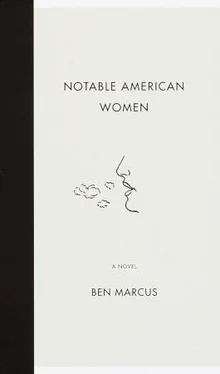Remarking on conditions and situations already observed by others (the Fact Checker).
Speaking in an accent, to deflect attention from his real voice (the Traveler).
Remarking on his own feelings, presuming outside interest in the statistics of his inner life (the Teacher).
Using words of encouragement and approval when others make observations, because he chooses to be viewed as an enabler and an approver (the Mother).
Asking questions of others merely to hint at the questions he wishes were asked of him (the Poet).
Describing activities he plans one day to undertake in order to suggest an attractive version of himself that has yet to occur (the Scheduler).
Mentioning information he has read about (the Stringer).
Commenting with value phrases on the various things that can be seen or heard or felt, positing himself as a prioritizer or cataloger of whatever can be perceived (the Goalie).
Or finally a young man who only uses language to condemn his parents for launching him in the first place, accessing the blame region of language and utilizing it fully to discredit us (the Person).
It should not matter to us what strategies Ben concocts as a young language user in America, nor should his father and mother compete to apprentice him to their own separate approaches, weak and useless as they are: using words to articulate accomplishments or reasons to be loved (father), using words to describe one’s own shortcomings so fluently that pity is invoked (mother, long ago), using words to lull employees into slavish compliance (father), or no longer using words at all, unless quietly typed to her former husband in a final missive (mother).
Regardless of how we each have failed to traffic in language with any newness at all, a failure we can mourn at some other time (though I would suspect even our mourning style to be derivative, repetitive, selfish), let us for now please agree not to launch an undernourished boy who will be broken open one day and left to fail this world forever on one of our doorsteps (not that your quarters feature a doorstep, though your current home is certainly nicer than where you’re going). For my part, I should not like to feel responsible for a dead boy, particularly as I near completion of my Responsibility Fasting Procedure, my Obligation Shedding Schedule. A decease at this time, particularly of my own child, would be a clear setback, would implicate me in feelings I am no longer interested, or lazy enough, to have.
Because of this speech allergy, Jane Dark is no longer able to read to him from The Unwritten Books of Susan without Ben turning rigid and blank. Can language of this sort act directly on his spine? I know that you advocate a children’s rash, or at least that you have seen rashes as a sign of change, the body fighting the world, for if it is not in collision, then it must be in retreat, and thus weak and afraid, doomed. “What is a rash?” you asked me once while we huddled in the back of a Dating Shelter in Akron, seeking our own private water fountain. Before I could shed my assumptions, as I had learned to do, and formulate some new and impressively lateral idea about skin inflammation as it relates to anxiety, ambition, and behavior concealment — because back then I suffered from a panic to produce for you ideas that were just beyond comprehension, odd and inscrutable enough to baffle or intimidate my audience — you spoke rapidly about armor and inner wind, the body’s topography, how people map one another and produce personality landscapes on their skin, so that the flesh is a mirror, and the rash only reflects the disease of the person nearby, a theory positing the skin as a truth serum, what you called “the divining layer,” “more revealing than a fossil” (your words), which, even if true, does not justify a collection of pelts in the home, or the encouragement of intact skin shedding in a certain man’s daughter.
Let’s say, for the sake of being extremely bored of this argument of yours, and to demonstrate my indifference to it, my “supremacy” (your words), my ability to concede to ideas I privately know to be romantic and flawed, that Ben’s rash is a sign that I am ill, or that we women here are wrong in the body and soon to decline, and Ben is reflecting our decay by adopting raised red bumps all over his chest. My son is a flag for my disorder. We have children so they might advertise our inadequacies. Giving birth is akin to producing proof. The very existence of Ben proves something; his body is litmus, an Empathy Skin. Let’s say it. Consider it said. It has been said.
Now, here on the women’s side of the house we are left with a boy who would scratch his chest until it bled if we didn’t glove his hands, and I must fall back on what I’m sure you’ll determine a conservative notion: that Ben should not gouge at his chest so ruthlessly. If he is to dig, he should dig away from his body. That is what backyards are for: to dig holes, to maybe dig holes big enough for people, to then put people in the holes, and cover them back up again with dirt. To then recite statements atop these holes pertaining to the people within them, to describe atop these holes those people in the holes. To praise them, salute them, send them faithfully away. No hole in Ben’s chest will be big enough to hold another person. There are no graves located on people’s bodies. We do not exhume our own chests for other people’s bones. Digs do not occur at these sites. We do not plant stones there to mark the fallen. We do not place flowers. The body is not a hole, not a grave. Ben should not dig there. My justification? His chest covers his heart. Or perhaps you’d like to downplay the importance of the heart, as well.
Now, final topic. You and I. What is left for us? We will not fuck again. We will not meet. We will not touch each other, or converse. You will not see me again. I will see images of you: photographs, drawings, acetate motion charts. Possibly some EKG readings. A short film will be made of your departure.
Which leaves, finally, Ben’s future.
If Ben elects voluntary paralysis when he turns eighteen, and inhabits a silent suit down at the Akron Stillness Center, I would at least like him to have experienced, for the purposes of later dismissal, the dubious pleasures and vague disappointments of running, jumping, sliding, and walking, the dullness and fascination of being able to lead his own body off road into the woods, up ladders, onto roofs, or down the emotion-reduction luge chute, not least because these technologies of personal transport might deliver him beyond the compound of the house and its satellite buildings — its barns and silos and fainting tanks — into the city, and to the natural preserves he has probably noticed pulsing somewhat dimly on the horizon.
He spends enough time on the roof for me to guess that he is one of those young people interested in the distance, in objects that he can see but cannot touch. Since you and I discovered in our time together that touching something, such as a boy, or each other, infected it with ourselves and thus spoiled our curiosity for it, because our attractions for others were based on our repulsion for ourselves, it will probably be useful to allow Ben access to those regions we most wish him to dismiss (other people, other places), to let him realize on his own how dull the world can be. Let us not imprison him before giving him a chance to imprison himself.
I do not share Ben’s interest in the distance, and I do not want to presume to know the boy (I am not interested in the trap of empathy or the false comfort [any other kind?] of understanding), but he must be looking at something.
Thinking back on my own life, which technically does not interest me, there was a time when I felt a distracting curiosity about mountains, as much as I tried to discipline myself against it. Something felt unfinished in me when I regarded the hills and swells around my childhood home, areas my father referred to as “mistakes in the terrain.” I thought, Even though the world spins so fast, how come it hasn’t smoothed down these so-called mountains? Why are they still so lumpy when the wind has leveled everything else? Are mountains just a failure of wind? Shouldn’t the earth be less interesting? Otherwise what does one do with something that is merely pretty? And ultimately: Why am I being tested this way? I felt as though I had eaten someone else’s emotions and they were swimming in my body, that I had strong feelings that weren’t my own. I was hosting another person inside myself, like that man in the famous book who eats his family to protect them from the sun. My choice: either digest the person or perform it out of myself, invert myself and cleanse my feelings. (This is what it is to feel things: to feel like someone else.) It wasn’t the loss of control that made me sick, but my utter unfamiliarity with myself, the disappointment of discovering reactions and attitudes to the world that seemed so highly predictable. Here I was, just another girl responding to beauty, and the inevitability of this disposition to the world seemed like a terrible loss of control, a vastly disappointing conformity I had hoped to be exempt from.
Читать дальше












